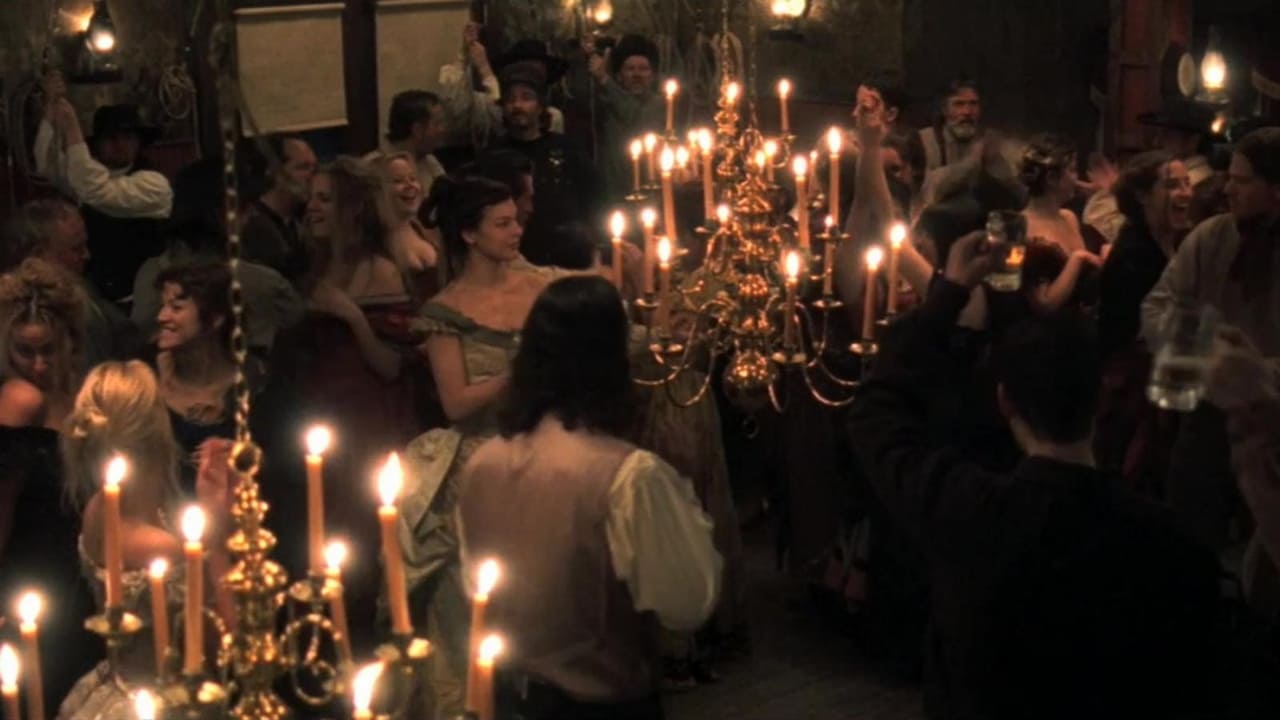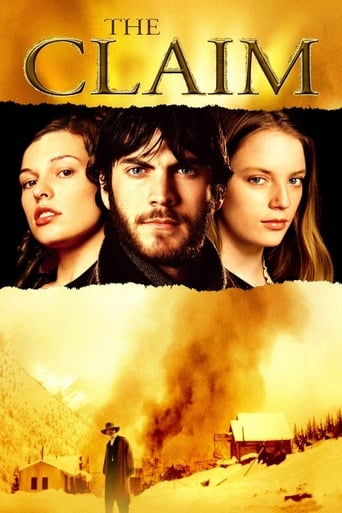



Better Late Then Never
Entertaining from beginning to end, it maintains the spirit of the franchise while establishing it's own seal with a fun cast
View MoreIt's hard to see any effort in the film. There's no comedy to speak of, no real drama and, worst of all.
View MoreThis movie feels like it was made purely to piss off people who want good shows
View MoreThe Claim is a story fans of Dickens will recognise. No spoilers here, but the wind-up packs a classic one-two punch moral of the sort 19th century literature made famous. Given the period setting, it works very well. The Old Testament flavour (in a story set in a town literally named Kingdom Come) is also blatant and well-written. In a nutshell: you got Paint Your Wagon, minus the song and dance, plus meaningful commentary and careful attention to detail. As a historically-accurate, painstakingly-filmed New Western, this movie deserves to be shelved alongside such other outstanding titles as Jeremiah Johnson, Little Big Man, and Butch Cassidy and the Sundance Kid. If you liked those, see this. (PS: Some reviewers are mad because the story is slow, grey, bleak, and understated, with little "action". That's also a fair description of the Old West. When you're done watching The Claim, you've been there.)
View MoreIn 1840's Missouri, the launching pad for manifest destiny, they used to say about people preparing to go West when it was most of it unsettled wilderness, that they were "jumping off". The film is about several such people who have made the jump from faraway homes, some are Irish come West with the famine, others Polish-born or from Lisbon."Jumping off", the phrase connotes the vastness of no man's land, a kind of cosmic gap.Ford's western wrote the legend, but left out those gaps of muddled life, which had to wait until around the time of Altman's McCabe & Mrs. Miller. The filmmaker shoots in this mode, so muddled life, drifting gaze, lingering shots of ordinary nothing. Vast mountain nature.But he also wants this to be an elegy to the passing of the West in that reflective vein of recent westerns, and some questionable acting, soporific drama and overly-emotive Nyman score, negate the unobtrusive lightness of just life. So this was probably ruined on a technical level, but there is something to recommend it.One of those who jumped off is a man, who in a log cabin one night with snow-blizzards raging outside, bartered everything he would need to be whole as an old man for what he would eventually have too much of to have any use for. He has built a town with his gold, but that night of years ago which has left a gap in him comes back one day.The notion is that you wake up one day and life has gone, and so long as it settles on this in a visual way, the film has spark. There is a great shot worthy of Herzog, where he has a two-story frame house hauled by horses across the snow, a home for his loved one— this is how deeply he regrets that night.This will be later mirrored in the whole town relocating to where the new railroad is going to pass through—which leaves him stubbornly alone in his empty town. This is followed by a great finale of madness and ruin.But there is too much doodling in the snow with second-rate romance and elegy, it never takes off from the edge. It's ultimately a letdown, which is a shame, because when you go through it all, there is a great film somewhere in there.
View MoreIf William Shakespeare's plays can be staged as Freudian science fiction or medieval samurai dramas, and Jane Austen re-written as an airhead Beverly Hills teen comedy, why can't Thomas Hardy's 'The Mayor of Casterbridge' be transplanted from rural Dorcetshire to a rough and tumble California mining camp during the 1849 gold rush? After all, the change of scenery in Michael Winterbottom's screen adaptation (here given the more marquee-friendly title 'The Claim') is only geographic, putting a visually restless Western spin on an otherwise typically mannered Old World allegory of guilt and retribution.The title character of Hardy's novel is now a wealthy, influential magnate in a Mother Lode boomtown likely to go bust unless the Central Pacific can lay its proposed trans-continental railway within whistle distance of the mines. His town is named (with undisguised significance) Kingdom Come, and in true literary fashion its leading citizen is hiding a terrible secret.Flashbacks (early enough in the film to not require a spoiler alert) reveal the awful truth: as a starving young immigrant he coldly traded his own wife and infant daughter for the lucrative grubstake that would give him all his subsequent prosperity and power. Years later, his dying wife and now grown daughter (the latter ignorant of her pedigree) have returned to Kingdom Come, and their arrival by stagecoach, together with the young engineer from the railroad survey team, is the fateful curtain opener and catalyst for what follows.It sounds compelling, and on a purely cosmetic level the film is a welcome relief from the usual medley of Hollywood sequels, spin-offs, remakes and rip-offs now crowding the nearest multiplex. But somewhere in translation from print to screen some of that dramatic potential was lost, smothered under the too relentlessly grim and oppressive presentation.One hundred and twenty minutes of overcast skies and drifting snows can leave a bitter aftertaste with even the most stalwart viewer, although it needs to be said that the near palpable winter chill is more or less faithful to the spirit of the original novel. According to the Concise Columbia Encyclopedia (a handy one-volume, all-purpose reference guide) Hardy was known for writing "generally gloomy, naturalistic studies of character and environment", which is about as tidy a description of the film as anyone could ask for.Paraphrased in less formal vernacular, the gist of it can be summed up even more simply: "Life stinks – get used to it." Winterbottom goes out of his way to vividly depict the Old West in all its true, unromantic squalor, creating a ramshackle plywood metropolis populated by a rootless community of bickering whores, drunken miners, unlucky gamblers, and other assorted vagabonds on the muddy road to El Dorado. Even the more lavish boudoir of the local nabobs ('mayor' Peter Mullen and his 'Portuguese' mistress Milla Jovovich) is under lit to the same shabby monochrome.Add some fashionably sloppy cinema veritè camera-work and the result is a handsome but frigid retro-70s downer, heavily in debt to Robert Altman's 'McCabe and Mrs. Miller' but conspicuously lacking Altman's anti-Hollywood iconoclasm (not to mention Warren Beatty's marquee value charisma). Winterbottom certainly deserves a round of applause for at least attempting to de-glamorize the traditional silver screen whitewash of frontier life. But despite the rich texture of the period detail he still can't resist putting a halfway romantic halo around the raw vulgarity of his setting. Maybe it's an unavoidable side effect to spinning a Western tall tale. Heck, even Sam Peckinpah's 'Wild Bunch' had their moments of misty-eyed, sloppy macho sentimentality.You can see it here in the majestic alpine scenery, meant to be California but shot (somewhat obviously, to this displaced Westerner) in the more visually epic Canadian and Colorado Rockies. (A quick historical nitpick: the California gold rush took place in the lower Sierra Nevada foothills, nowhere near the timberline location of Kingdom Come.) You can see it also in the glistening teeth and glowing complexion of Wes Bentley and Sarah Polley, looking perhaps too fresh and contemporary against the mid 19th century grubbiness of their surroundings.Bentley is the young survey engineer attracted to Polley, the unsuspecting long-lost daughter of town boss Peter Mullen. And it shouldn't surprise anyone to find their budding relationship given center stage over what should have been the real meat of the scenario: the troubled reconciliation between a conscience-stricken Mullen and his estranged, dying wife, played by Nastassja Kinski.Maybe it wasn't written like this, but somewhere in the editing room the focus shifted away from the tragic consequences of Mullen's Faustian bargain, upsetting the already lopsided narrative balance in favor of the (more photogenic) younger actors. Consider it a token olive branch extended to an audience asked to endure a long, cold, and otherwise uninvolving drama.Bentley himself is allowed the final, inexplicably optimistic epitaph, after the town of Kingdom Come, and the compromised reign of its founding father, have both achieved their (not unpredictable) fiery purgation. "They're like kings", he tells Polley, gazing in awestruck admiration at the gray parade of pioneers bringing civilization to the untamed American wilderness. Nobody mentions the fact that all this activity is at the compulsion (and to the ultimate profit) of the railroad monopolies, but never mind. It's a silver lining to send the paying customers home happy, and set the shade of Thomas Hardy spinning in his grave.
View MoreIt's the Old West in Canada. A young man (Peter Mullan) trades his wife (Nastasja Kinski) and baby (later to turn into Sarah Polley) for a gold mine and years later becomes the benign dictator of the town of Kingdom Come. He builds a splendid home, along the lines of a slapdash version of Mad King Ludwig's.The railroad plans to pass by, but not through Kingdom Come. Along with the rush of people, there is Kinski, now terminally ill, and Polley, who does not know that Mullan is her father. Kinski asks for help and Mullan remarries her in what seems to be an attempt to undo the immoral act he earlier committed. Not that he's in any big hurry to get rid of his monumental stash of stone-heavy gold bars in the locked shed next to his house.Milla Jovovich is present as one of the more prominent whores in the flourishing cat house.You know -- whatever else this movie has or does not have -- it must be said that this is a talented line up of gorgeous babes. Kinski, Polley, and Jovovich. Murderer's Row of pulchritude. And Kinski, though now old enough to play a the mother of a grown woman, is stunning. Age cannot wither nor custom stale her. They all turn in professional performances too.It's all pretty tragic however. It's clear that Mullan is ridden with guilt and love but Kinski's destiny is fulfilled, so he's missed out on the most fruitful time they might have spent together. He's compelled to tell Polley that he's her real father and she stalks off into the snow without a word.Then there's that pesky railroad. Since it will run through the plain below, it leaves Mullan and his mountain empire high and dry. Everyone leaves Kingdom Come to establish the new railroad town down there -- somewhere.It's all too much for Mullan. He burns down the town he built and consigns himself to a snowy death.It's a very deliberately paced and realistic-looking Western. The clothes are suitably heavy and drab. The mountains are majestic and snow-veined but as cold and forbidding in their own quiet way as the people who populate the town. There is laughter and booze, but it all seems forced. Nobody's love is fully expressed. There's no operatic content.There's a little gun play too, but this is a Canadian movie and Canadian movies are always thoughtful, slow, a little dark, and lacking in scenes in which someone's head explodes or an arm is wrenched off or an eye gouged out. I can't even think of a Canadian film in which someone visits a dentist.I admire it for its location shooting and for the performances, however reined in they are by the script and direction. Ultimately it's a gloomy story. No one enjoys seeing someone utterly demolished in spirit on the screen, not even a miscreant like Mullan. At least he was capable of remorse.
View More